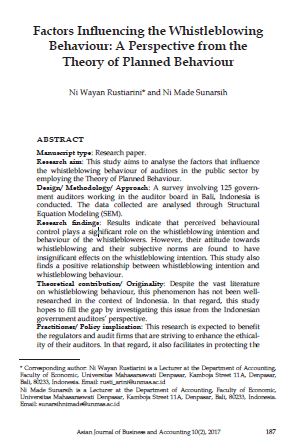Factors Influencing the Whistleblowing Behaviour: A Perspective from the Theory of Planned Behaviour
Main Article Content
Abstract
Research aim: This study aims to analyse the factors that influence
the whistleblowing behaviour of auditors in the public sector by
employing the Theory of Planned Behaviour.
Design/ Methodology/ Approach: A survey involving 125 government
auditors working in the auditor board in Bali, Indonesia is
conducted. The data collected are analysed through Structural
Equation Modeling (SEM).
Research findings: Results indicate that perceived behavioural
control plays a significant role on the whistleblowing intention and
behaviour of the whistleblowers. However, their attitude towards
whistleblowing and their subjective norms are found to have
insignificant effects on the whistleblowing intention. This study also
finds a positive relationship between whistleblowing intention and
whistleblowing behaviour.
Theoretical contribution/ Originality: Despite the vast literature
on whistleblowing behaviour, this phenomenon has not been wellresearched
in the context of Indonesia. In that regard, this study
hopes to fill the gap by investigating this issue from the Indonesian
government auditors’ perspective.
Practitioner/ Policy implication: This research is expected to benefit
the regulators and audit firms that are striving to enhance the ethicality
of their auditors. In that regard, it also facilitates in protecting the country from abusive and corrupted practices which can cause losses
for the country.
Research limitation/ Implications: While whistleblowing behaviour
may be influenced by numerous factors, this study only considers
the individual factors. Hence, future research should incorporate
organisational, situational, and demographics factors in investigating
the issue.
Keywords: Auditor, Behaviour, Corruption, Fraud, Whistleblowing
JEL Classification: M40
